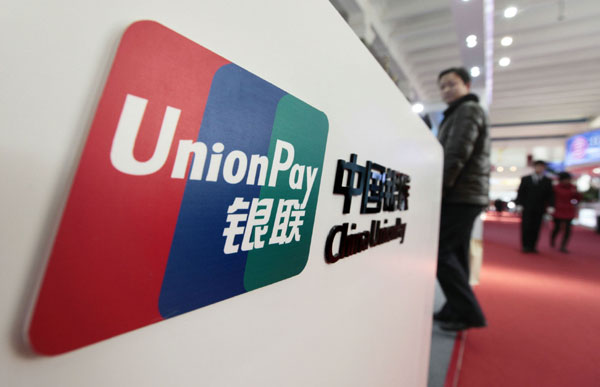
|
 |
|
A China UnionPay Co Ltd stand at a financial fair in Beijing. The company plans to significantly increase its global footprint over the next two to three years. [Photo/China Daily] |
China UnionPay Co Ltd, the country's largest bank card payment processor, aims to expand the international issue of its single-branded cards, to up the ante on its main cross-border transaction rival, Visa Inc.
Over the next two to three years, the Chinese company plans to significantly increase its global footprint from the current 141 countries and regions, said UnionPay President Xu Luode.
"China UnionPay always positions itself as a modest participant and we welcome collaboration. However, Visa has been acting very aggressively," he said.
"Therefore, we need to strengthen our own capabilities to avoid such disputes," said Xu, also a national legislator from Shanghai attending the current session of the National People's Congress.
Ninety-five percent of debit cards issued by UnionPay on the Chinese mainland are single-branded, meaning that all transactions can only go through the UnionPay payment channel.
Xu said about half of credit cards are co-branded with international players such as Visa and MasterCard, but his firm will try to lower the proportion in the next few years as its own overseas network expands rapidly.
UnionPay has issued more than 16 million cards abroad, which are all single-branded cards bearing the UnionPay logo only, he said. He now expects that number to soar by between 30 and 50 percent annually over the next three years.
According to Chinese laws, foreign credit card companies need to co-brand with Chinese partners to support card services or process interbank point-of-sale transactions.
"Co-branding cards is a stopgap measure. Back then, international companies had the desire to tap into China and we relied on them to reach the overseas market.
"Now that UnionPay's network is greatly enhanced, users are free to choose their preferred payment system," Xu said.
The clash between the two rivals heightened in 2010, when Visa warned banks not to adopt the UnionPay payment system to process international transactions for co-branded Visa and UnionPay credit cards circulated in places other than the Chinese mainland.
It warned merchants to comply with the rules or face penalties, a demand Visa made of all its partners around the world.
But Xu said he believed both companies have a responsibility and obligation to provide overseas transaction services to co-branded cardholders.
"Neither side has the right to unilaterally restrict cardholders' options for overseas payment channels."
In contrast, UnionPay has maintained a sound relationship with MasterCard.
The dispute led to a WTO intervention last year, when a panel rejected the unfounded "monopoly" claims by Visa on UnionPay for processing all domestic renminbi payment card transactions.
But it concluded that China acted inconsistently with its market access commitment in maintaining the company as a monopoly supplier for the clearing of certain types of renminbi-denominated payment card transactions.
To avoid further direct confrontation, it is hoped the expansion of its global network will get UnionPay off the hook.
In November, UnionPay International Co Ltd was launched in Shanghai to beef up the building of the worldwide network.
Xu said the subsidiary company, run on a membership basis, has attracted more than 70 commercial banks, payment service providers and networks to facilitate Chinese nationals who spend overseas.
"It is a two-step solution. First, we try to serve Chinese travelers by offering our channels. Then, we move to the second stage by issuing local currency-denominated cards to local people," he said.
 'Cat model' to dazzle Shanghai auto show 2013
'Cat model' to dazzle Shanghai auto show 2013
 Models at Tokyo modified car show
Models at Tokyo modified car show
 Shanghai Fashion Week focuses on domestic brands
Shanghai Fashion Week focuses on domestic brands
 Angel-dress models at Shandong auto show
Angel-dress models at Shandong auto show
 Safe and Sound
Safe and Sound
 Theater firms scramble for managers
Theater firms scramble for managers
 Premier pledges closer ties with Brunei
Premier pledges closer ties with Brunei
 Volkswagen's all-new GTI at New York auto show
Volkswagen's all-new GTI at New York auto show